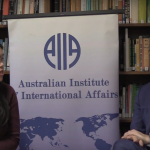Why is children’s television important?
Television has been accused of making our children obese and passive. Jenny Buckland, CEO of the Australian Children’s Television Foundation, argues that age-appropriate television programs for children can have a positive impact on their development.
Children’s television gets a lot of bad press: we’ve all seen alarming stories about how much television children watch, the violence children witness through television, and how television is linked to the obesity crisis.
But let’s put those concerns in perspective.
Whilst some children watch concerning levels of television, the overwhelming majority of children in Australia watch less than two hours of television a day, and many watch an hour or less a day. Indeed, children watch much less television than adults do. And children are not expressing a preference for violent or inappropriate television, either. Research shows that children are discerning viewers who can identify the differences between children’s, family and adult programming, and that they gravitate to children’s programs when they have control of the remote.
Some of the other things we now know about children and television are that:
- The favourite channels of Australian boys and girls aged 2-14 years are the non-commercial children’s channels ABC 2 and ABC 3
- Children express a strong preference for drama. They like it the best and say that it holds their attention more than any other type of programming
- When children are asked to nominate their favourite shows, Australian programs feature prominently
- Children enjoy watching television as a family activity and especially love it when Mum and/or Dad is watching with them
- Children watch primetime television shows on commercial television in the early evening in large numbers because that is a family activity.
Most of us have fond memories of the television programs we enjoyed as a child – programs that became part of a shared culture, like other forms of storytelling. Good television programs are a vital part of our culture.
So if we are concerned about children and television, I think we should be just as concerned about what children watch, as we are about how much time they spend watching TV.
Researchers from the Seattle Children’s Research Institute are recommending a shift from recommendations limited to the amount of time children spend watching television to a greater focus on the actual content that children are watching because of the positive impact that TV can have on behaviour, social skills and educational outcomes. They suggest that we need to swap inappropriate content for better content which is made especially for children.
We tend to take good content for granted. We shouldn’t. Children’s television is harder to finance than adult television, and broadcasters don’t want to spend money on producing it. We need to continue to push for the commercial channels to screen minimum levels of children’s content and to pay reasonable amounts for it in order to ensure quality content is produced. Beyond Play School, even the ABC was commissioning and producing very little new Australian content for children before a special injection of funds for ABC 3 in 2009. We need to insist on continued tied funding for children’s programs on the ABC to ensure that this audience is not neglected.
In July, ABC 3 will screen the third series of its most successful Australian drama, Dance Academy. Many 11 to 15 year olds are devotees of this show. If you have children in this age group, I thoroughly recommend that you find the time to watch it with them. But be prepared – it might lead to some great discussions at home about the politics of friendship groups, body image, balancing social and school lives, emerging sexuality and much more.
This is the special thing about watching great drama. It engages our hearts and minds and brings us closer together. Our children deserve that as much as we do.
Jenny Buckland is the CEO of the Australian Children’s Television Foundation. She is a lawyer with extensive experience in the production, financing and international distribution of children’s television programs.












